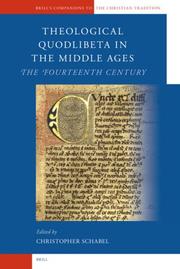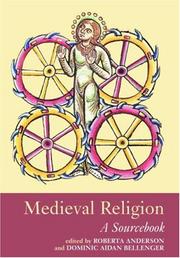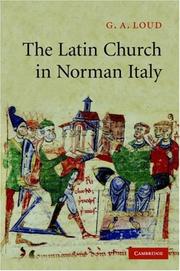| Listing 1 - 10 of 40 | << page >> |
Sort by
|
Book
ISBN: 1282187740 9786612187742 3110215721 9783110215724 3110212544 Year: 2009 Publisher: Berlin New York W. de Gruyter
Abstract | Keywords | Export | Availability | Bookmark
 Loading...
Loading...Choose an application
- Reference Manager
- EndNote
- RefWorks (Direct export to RefWorks)
In dem vorliegenden Band beschäftigt sich der renommierte Münsteraner Historiker Wilhelm Kohl erneut mit einem Kloster der Diözese Münster im Rahmen der Reihe Germania Sacra. Nach den bei Münster gelegenen Stiften Nottuln (GS NF 44) und St. Mauritz vor Münster (GS NF 47) knüpft der Band über das in der Stadt Münster gelegene Kloster der Zisterzienserinnen, später dann Benediktinerinnen, St. Aegidii an die bereits erschienenen Bände der städtischen Kommunitäten Domstift St. Paulus (GS NF 17) und das Stift Alter Dom (GS NF 33) an. Nach dem bewährten Schema der Germania Sacra werden die Quellen des um 1200 gegründeten Klosters ebenso vorgestellt wie seine Geschichte, Verfassung, das religiöse und geistige Leben sowie sein Besitz. Die Personallisten, von den Äbtissinnen über die Priorinnen und Kellnerinnen bis hin zu den Nonnen und den Pröpsten, Beichtvätern, Vikaren etc. zeigen, dass die Geschichte eines Klosters immer von den ihm angehörigen Personen abhängig ist. Mit diesem Band, den ersten der 3. Folge der Germania Sacra, setzt die Reihe erfolgreich ihre Bemühungen um das Bistum Münster fort.
Benedictine monasteries --- Dioceses --- Catholic Church --- Benedictine nuns. --- Church history/ Middle Ages. --- Cistercian nuns. --- Germania Sacra. --- Munster/Diocese.

ISSN: 18716377 ISBN: 9789004162884 9004123334 9789004123335 9786611384388 1281384380 9047404149 9789047404149 Year: 2006 Volume: 1, 7 Publisher: Leiden: Brill,
Abstract | Keywords | Export | Availability | Bookmark
 Loading...
Loading...Choose an application
- Reference Manager
- EndNote
- RefWorks (Direct export to RefWorks)
This is the first of two volumes on theological quodlibeta, records of special disputations held before Christmas and Easter circa 1230-1330, mostly at the University of Paris, in which audience members asked the great masters of theology the questions for debate, questions de quolibet, "about anything." The variety of the material and the authors’ stature make the genre uniquely fascinating. In Volume I, chapters by acknowledged experts introduce the genre, cover the quodlibeta of Thomas Aquinas, Henry of Ghent, Giles of Rome, Godfrey of Fontaines, and 13th-century Franciscans, and demonstrate how the masters used quodlibeta to construct and express their authority on issues from politics and economics to two-headed monsters. For all those interested in medieval studies, especially intellectual history.
Theology --- Church history --- History --- Religious disputations --- Théologie --- Eglise --- Disputations religieuses --- History. --- Histoire --- Christianity --- Middle Ages, 600-1500 --- Theology - History - Middle Ages, 600-1500. --- Church history - Middle Ages, 600-1500.
Book
ISBN: 3700183550 3700181094 9783700181095 Year: 2018 Publisher: Wien: Österreichische Akademie der Wissenschaften,
Abstract | Keywords | Export | Availability | Bookmark
 Loading...
Loading...Choose an application
- Reference Manager
- EndNote
- RefWorks (Direct export to RefWorks)
Church history --- Innocent --- Innocentius --- Innocenz --- Innocenzo --- Innozenz --- de' Conti, Lotario --- dei Segni, Lotario --- dei Conti di Segni, Lotario --- Lotario dei Segni --- Segni, Lotario di, --- Segni, Lothair of, --- Church history - Middle Ages, 600-1500 - Sources
Book
ISBN: 1283402688 9786613402684 3110262037 3110262029 Year: 2011 Publisher: Berlin ; Boston : De Gruyter,
Abstract | Keywords | Export | Availability | Bookmark
 Loading...
Loading...Choose an application
- Reference Manager
- EndNote
- RefWorks (Direct export to RefWorks)
In medieval Europe, the death of a king could not only cause a dispute about the succession, but also a severe crisis. In times of a vacant throne particular responsibility fell to the bishops - whose general importance for the time around the first millennium has been revealed by recent scholarship - as royal counsellors and policy makers. This volume therefore concentrates on the bishops' room for manoeuvre and the patterns of episcopal power, focusing on the Eastern Frankish Reich and Anglo-Saxon England in a comparative approach which is not least based upon the research of a renowned medie
Church and state - Europe - History. --- Church and state -- Europe -- History -- Congresses. --- Church history - Middle Ages, 600-1500. --- Church history -- Middle Ages, 600-1500 -- Congresses. --- Episcopacy - History. --- Episcopacy -- History -- Congresses. --- Episcopacy --- Church and state --- Church history --- Religion --- Philosophy & Religion --- Christianity --- History --- Christianity and state --- Separation of church and state --- State and church --- Bishops --- Collegiality of bishops --- Collegiality --- State, The --- Church polity --- Apostolic succession --- Bishops. --- East Franconia. --- England. --- Power.
Book
ISBN: 9783110308457 9783110308532 3110308452 3110308533 Year: 2013 Volume: 2/4 Publisher: Berlin: de Gruyter,
Abstract | Keywords | Export | Availability | Bookmark
 Loading...
Loading...Choose an application
- Reference Manager
- EndNote
- RefWorks (Direct export to RefWorks)
Die als ökumenisches Konzil durchgeführte Konstantinopler Synode von 691/2 nimmt mit ihren 102 Kanones eine Kodifizierung des altkirchlichen Kirchenrechtes vor und wird in den orthodoxen Kirchen der byzantinischen Tradition zu den sieben Ökumenischen Konzilien der Alten Kirche gerechnet. Sie steht an der Grenze zwischen den großen kirchenpolitischen Kontroversen des 7./8. Jahrhunderts (monotheletischer Streit; Bilderstreit), die im Konzil und seinen Beschlüssen nachwirken oder sich schon andeuten. Wegen einiger Kanones, die sich gegen römische Traditionen wenden, war die Synode Gegenstand kontroverstheologischer Auseinandersetzungen seit dem 9. Jh. bis in neuere Zeit. Ihre Akten sind von besonderer Bedeutung für die Konziliengeschichtsforschung, die Geschichte der Beziehungen zwischen lateinischer und griechischer Christenheit und die byzantinische Geschichte in einer an Quellen armen Zeit. Die hier erstmals vorgelegte kritische Edition der gesamten Akten auf der Grundlage von 72 Handschriften löst ältere Editionsversuche ab und schließt eine Lücke in den Acta Conciliorum Oecumenicorum als der maßgeblichen Editionsreihe der Ökumenischen Konzile der Alten Kirche.
262.5 --- 262.5 Oecumenische concilies:--algemeen --- Oecumenische concilies:--algemeen --- Quinisext Synod --- Quinisext Synod. --- Concilio Trullano --- Concilium Quinisextum --- Council in Trullo --- Synod in Trullo --- Trullan Synod --- Concilium Trullanum --- Church history -- Middle Ages, 600-1500 -- Sources. --- Councils and synods, Ecumenical -- History -- Sources. --- Councils and synods, Ecumenical --- Church history --- Ecumenical councils and synods --- Oecumenical councils and synods --- History --- Councils and synods, Ecumenical - History - Sources --- Church history - Middle Ages, 600-1500 - Sources --- Orthodox churches. --- Quinisext Council. --- canonical law. --- ecumenical council.
Multi
ISSN: 18784879 ISBN: 9789004206601 9004206604 9789004206595 9004206590 1283161834 9786613161833 Year: 2011 Volume: 20 Publisher: Leiden: Brill,
Abstract | Keywords | Export | Availability | Bookmark
 Loading...
Loading...Choose an application
- Reference Manager
- EndNote
- RefWorks (Direct export to RefWorks)
The papers collected in this volume explore the strategies through which Christian authorities throughout the early medieval world both established and expressed their social position, while at the same time drawing attention to the moments when those same processes were resisted and challenged. Where previous studies of Christianisation have for the most part approached the issue of dissent through the continued existence of paganism and the various Christian heresies, this volume suggests that the experience of doubt towards, and articulation of resistance to, the claims of Christian leaders extended far outside the circles of pagan intellectuals and dissident theologians. The result is a view of Christianisation as far more piecemeal, complex and incomplete than has often been acknowledged.
Christian sociology --- Church history --- Sociologie religieuse --- Eglise --- History --- Congresses --- Congresses. --- Christianisme --- Histoire --- Congrès --- Christian sociology - History - Early church, ca. 30-600. --- Christian sociology -- History -- Early church, ca. 30-600 -- Congresses. --- Christian sociology - History - Middle Ages, 600-1500. --- Christian sociology -- History -- Middle Ages, 600-1500 -- Congresses. --- Church history - Middle Ages, 600-1500. --- Church history -- Middle Ages, 600-1500 -- Congresses. --- Church history - Primitive and early church, ca. 30-600. --- Church history -- Primitive and early church, ca. 30-600 -- Congresses. --- Religion --- Philosophy & Religion --- Christianity --- -Church history --- -Christian sociology --- -27 "00/07" --- 27 <063> --- Ecclesiastical history --- History, Church --- History, Ecclesiastical --- Christian social theory --- Social theory, Christian --- Sociology, Christian --- Sociology --- -History --- -Kerkgeschiedenis--?"00/07" --- Kerkgeschiedenis--Congressen --- Conferences - Meetings --- Congrès --- 27 "00/07" --- Kerkgeschiedenis--?"00/07" --- Christian sociology - History - Early church, ca. 30-600 - Congresses --- Church history - Primitive and early church, ca. 30-600 - Congresses --- Christian sociology - History - Middle Ages, 600-1500 - Congresses --- Church history - Middle Ages, 600-1500 - Congresses
Book
ISSN: 18716377 ISBN: 9789004183537 9004183531 9786612952555 9004193480 1282952552 9789004193482 9781282952553 Year: 2010 Volume: 22 Publisher: Leiden: Brill,
Abstract | Keywords | Export | Availability | Bookmark
 Loading...
Loading...Choose an application
- Reference Manager
- EndNote
- RefWorks (Direct export to RefWorks)
The study of pastoral care in the middle ages has seen a resurgence in recent years. Scholars are now approaching this subject less from their respective ecclesiastical or parochial biases and more out of an effort to understand the significant role pastors (secular and religious) had in the shaping of medieval society at large. This book explores some of the new ways scholars are approaching this topic. Using a variety of sources and disciplinary angles: theology, preaching, catechesis, confessional literature, visitation records, monastic cartularies and the like, these studies show the many and varied ways in which pastoral care came to play such an important role in the day to day lives of medieval people. Contributors include: C. Colt Anderson, Michelle Armstrong-Partida, Beth Allison Barr, Sabrina Corbellini, Alexandra da Costa, Laura Michele Diener, William Dohar, James Ginther, Joe Goering, Ann M. Hutchison, Greg Peters, C. Matthew Phillips, Andrew Reeves, Ronald J. Stansbury, Susan M.B. Steuer, Mathilde van Dijk, and Anne T. Thayer.
Pastoral care --- Church history --- History --- Christian church history --- anno 1200-1499 --- Europe --- Seelsorge. --- Soins pastoraux --- Eglise --- Histoire --- Care of souls --- Cure of souls --- Church work --- Pastoral counseling --- Pastoral theology --- Christianity --- Middle Ages, 600-1500 --- Pastoral care - History - To 1500. --- Church history - Middle Ages, 600-1500.

ISBN: 9780415370288 9780415370271 0415370280 0415370272 1134372922 1134372930 9786610267491 1280267496 0203328671 9780203328675 9780415316866 0415316863 9780415316873 0415316871 6610267499 0415316863 0415316871 9781134372935 9781280267499 Year: 2004 Publisher: New York: Routledge,
Abstract | Keywords | Export | Availability | Bookmark
 Loading...
Loading...Choose an application
- Reference Manager
- EndNote
- RefWorks (Direct export to RefWorks)
Constance Berman presents an indispensable new collection of the most influential and revisionist work to be done on religion in the middle ages in the last couple of decades.
Christian church history --- anno 500-1499 --- Church history --- Eglise --- Sources --- Histoire --- 27 "04/14" --- Kerkgeschiedenis--Middeleeuwen --- Religion --- Christendom. --- Middeleeuwen. --- Religion. --- History. --- Religious history --- Christianity --- Middle Ages, 600-1500 --- Geschichte 500-1500 --- History --- Histoire de l'Eglise--Middeleeuwen --- #A0510HI --- Church history - Middle Ages, 600-1500. --- Religion - History.
Book
ISBN: 9781316503607 9781107138803 9781316481714 1107138809 1316503607 1316481719 1316482200 1316484785 1316485218 1316485641 1316486079 1316487792 9781316487792 Year: 2016 Publisher: Cambridge: Cambridge university press,
Abstract | Keywords | Export | Availability | Bookmark
 Loading...
Loading...Choose an application
- Reference Manager
- EndNote
- RefWorks (Direct export to RefWorks)
Making Early Medieval Societies explores a fundamental question: what held the small- and large-scale communities of the late Roman and early medieval West together, at a time when the world seemed to be falling apart? Historians and anthropologists have traditionally asked parallel questions about the rise and fall of empires and how societies create a sense of belonging and social order in the absence of strong governmental institutions. This book draws on classic and more recent anthropologists' work to consider dispute settlement and conflict management during and after the end of the Roman Empire. Contributions range across the internecine rivalries of late Roman bishops, the marital disputes of warrior kings, and the tension between religious leaders and the unruly crowds in western Europe after the first millennium - all considering the mechanisms through which conflict could be harnessed as a force for social stability or an engine for social change.
Civilization, Medieval. --- Church history --- Social structure --- Conflict management --- Civilisation médiévale --- Eglise --- Structure sociale --- History --- Histoire --- Civilization, Medieval --- Europe --- Histoire religieuse --- Civilisation médiévale --- Civilisation médiévale. --- Church history - Middle Ages, 600-1500 --- Social structure - Europe - History - To 1500 --- Conflict management - Europe - History - To 1500 --- Civilisation médiévale.

ISBN: 9780521255516 0521255511 9780511721083 9780521181488 9781107321236 1107321239 0511721080 0521181488 1107172608 1139809555 1107315840 0511939744 1107317789 1299399096 1107314860 Year: 2007 Publisher: Cambridge: Cambridge university press,
Abstract | Keywords | Export | Availability | Bookmark
 Loading...
Loading...Choose an application
- Reference Manager
- EndNote
- RefWorks (Direct export to RefWorks)
First published in 2007, this was the first significant study of the incorporation of the Church in southern Italy into the mainstream of Latin Christianity during the eleventh and twelfth centuries. Professor G. A. Loud examines the relationship between Norman rulers, south Italian churchmen and the external influence of the new 'papal monarchy'. He discusses the impact of the creation of the new kingdom of Sicily in 1130; the tensions that arose from the papal schism of that era; and the religious policy and patronage of the new monarchs. He also explores the internal structures of the Church, both secular and monastic, and the extent and process of Latinisation within the Graecophone areas of the mainland and on the island of Sicily, where at the time of the Norman conquest the majority of the population was Muslim. This is a major contribution to the political, religious and cultural history of the Central Middle Ages.
Mezzogiorno (Italie) --- -27 <45> "10" --- Kerkgeschiedenis--Italië--?"10" --- -Meridione (Italy) --- Mezzogiorno (Italy) --- Southern Italy --- -Church history. --- Church history --- 27 <45> "10" --- Christianity --- Middle Ages, 600-1500 --- Italy, Southern --- Meridione (Italy) --- Church history. --- Eglise --- Histoire --- Catholic Church --- History. --- Histoire religieuse --- Arts and Humanities --- History --- Church history - Middle Ages, 600-1500 --- Italie --- Normands --- Italy, Southern - Church history
| Listing 1 - 10 of 40 | << page >> |
Sort by
|

 Search
Search Feedback
Feedback About UniCat
About UniCat  Help
Help News
News